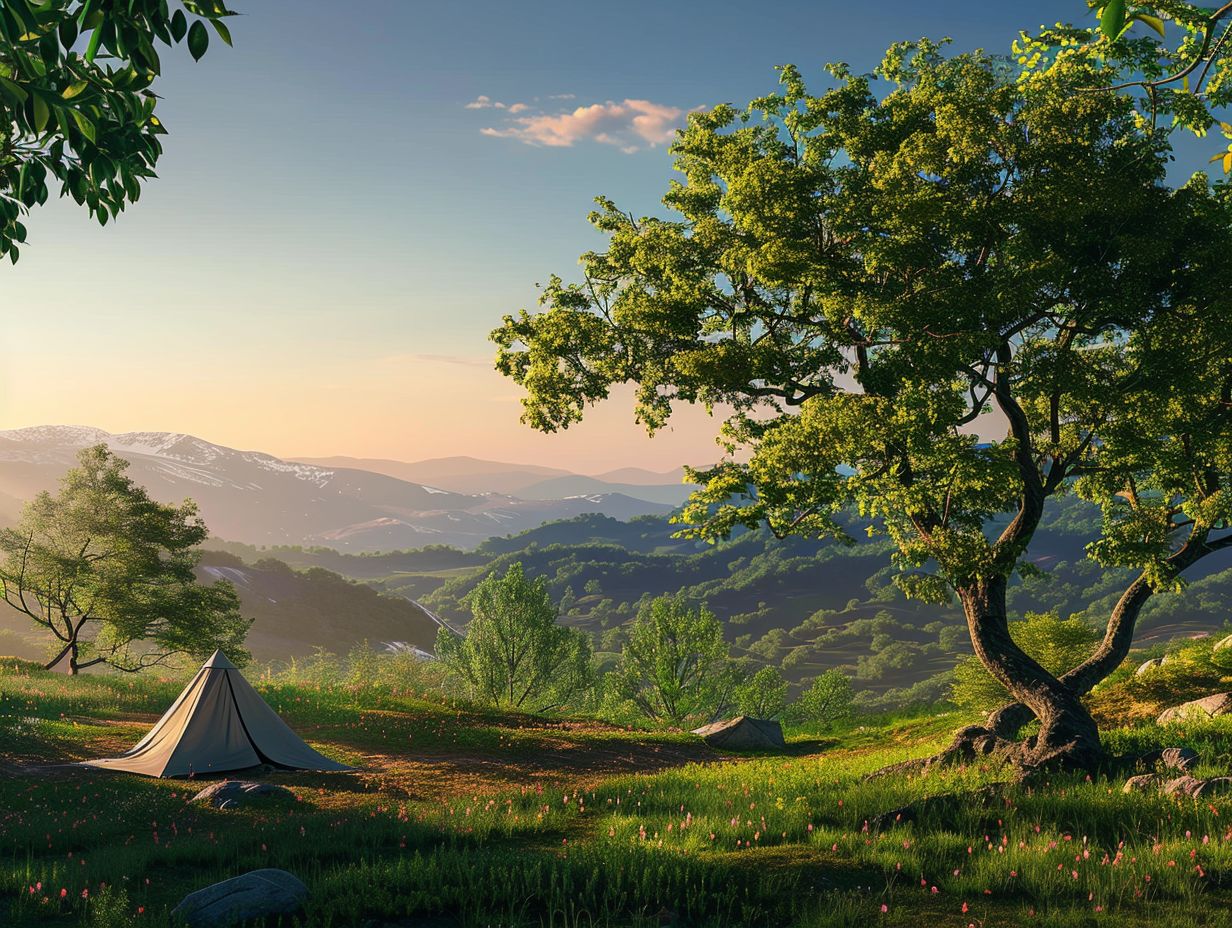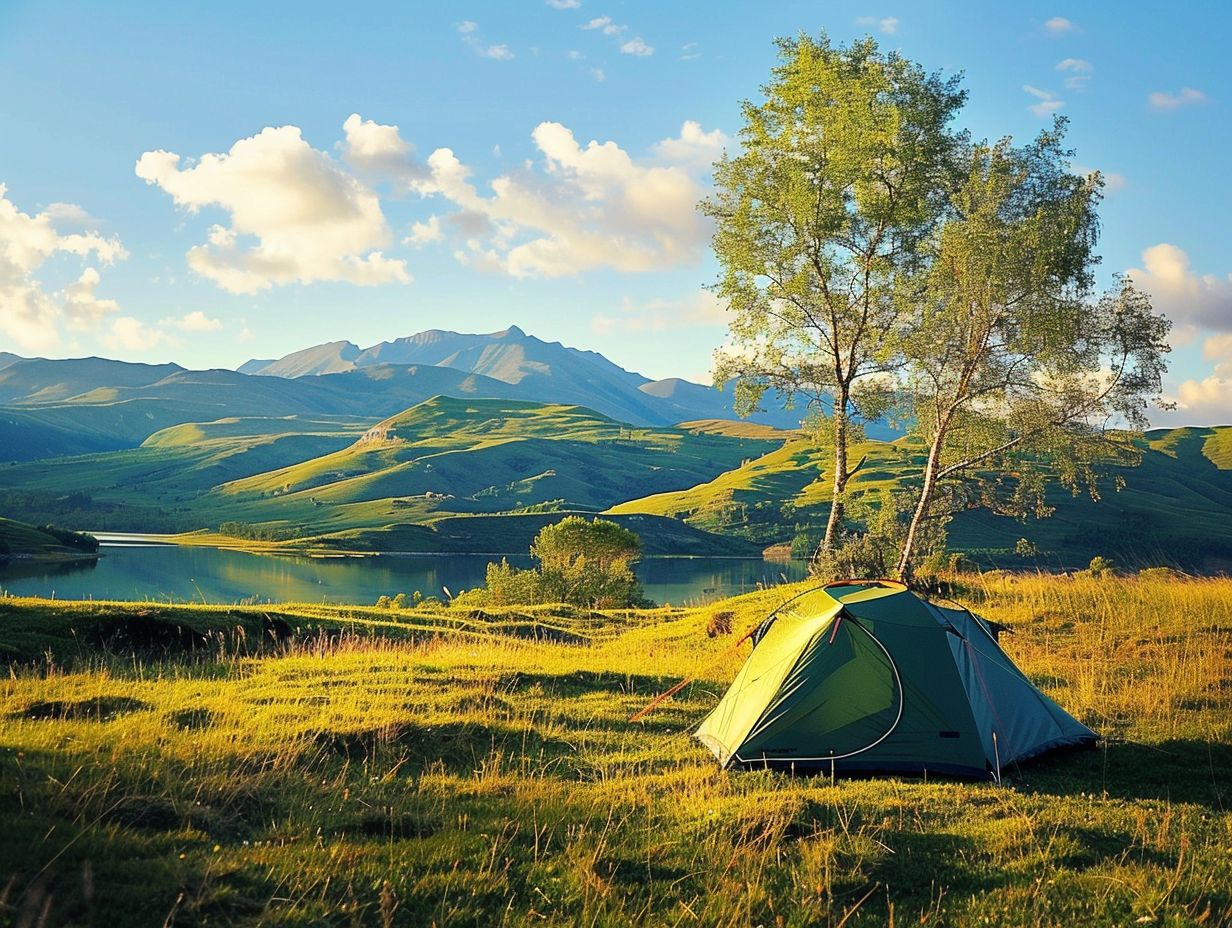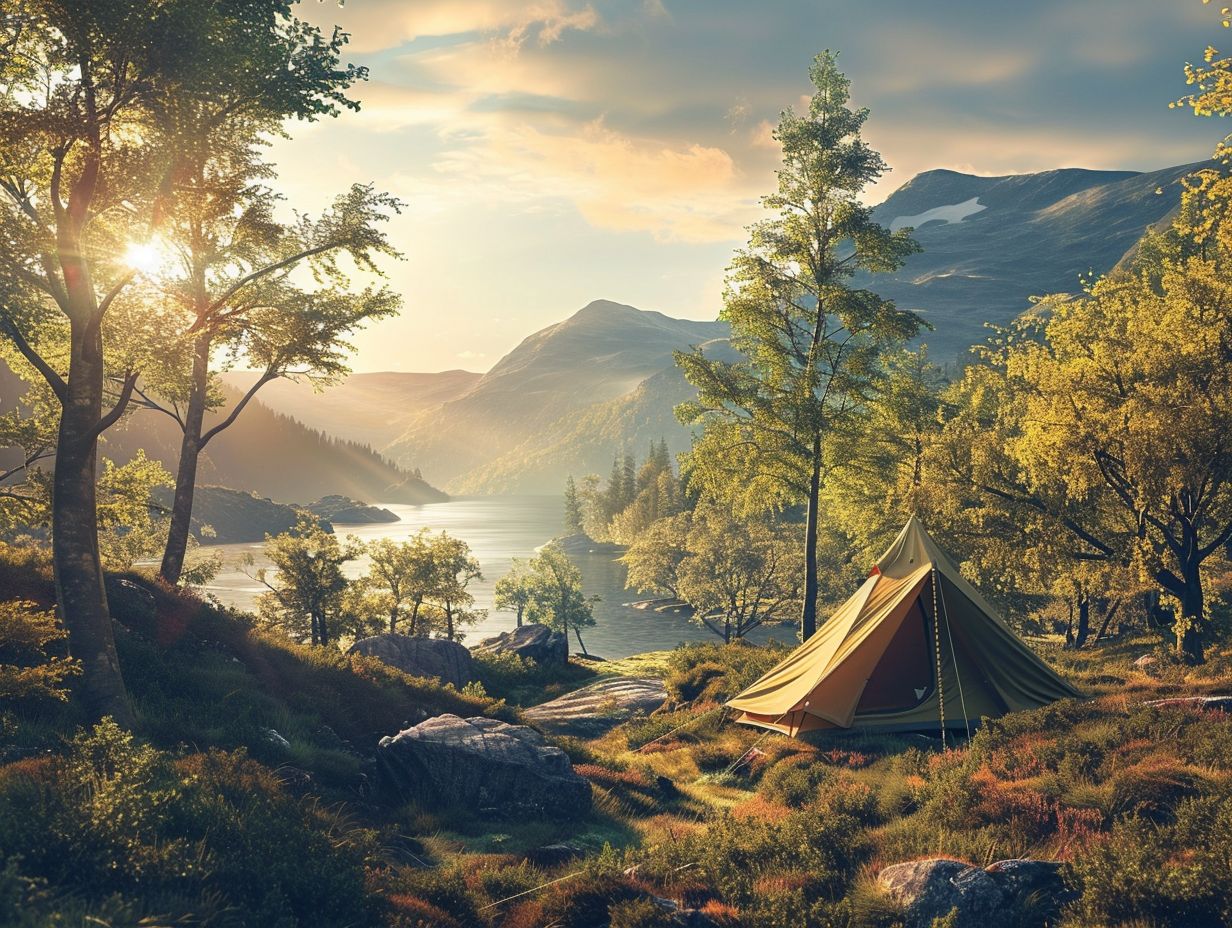If you are seeking a way to disconnect from the busy day-to-day routine and immerse yourself in nature, off-grid camping may be the ideal adventure for you.
This comprehensive guide to off-grid camping in Britain will delve into the benefits of this outdoor experience, including both environmental and personal advantages.
From acquiring essential equipment to selecting the appropriate location, all the necessary information to prepare for a successful off-grid camping excursion will be covered.
Be sure to follow along for insights on implementing Leave No Trace principles to reduce your environmental impact effectively.
Key Takeaways:

- Experience the beauty and serenity of nature with off-grid camping in Britain, away from the hustle and bustle of city life.
- Enjoy the environmental and personal benefits of off-grid camping such as reducing your carbon footprint and disconnecting from technology.
- Make sure to pack essential gear, carefully choose your location, and practice Leave No Trace principles for a successful and responsible off-grid camping trip in Britain.
What is Off-Grid Camping?
Off-grid camping, also known as wild camping, involves setting up camp away from traditional campsites or established facilities. It requires finding a spot in nature, such as a meadow or forest, and pitching a tent for the night.
This type of camping allows you to fully immerse yourself in the natural surroundings, fostering a sense of freedom and a deeper connection with the great outdoors. In contrast to campsite camping, which offers facilities and designated spaces, off-grid camping promotes a more self-sufficient and adventurous experience.
Waking up to the soothing sounds of birds chirping and leaves rustling, with no other campers in view, can be a truly rejuvenating experience.
Benefits of Off-Grid Camping
Taking part in off-grid camping offers a myriad of advantages, giving you the opportunity to pitch your tent under the starry expanse of the night sky, with the soothing melodies of nature lulling you to sleep within your sleeping bag.
This experience not only enables a real escape from the fast-paced tempo of everyday life but also allows you to fully immerse yourself in the tranquil atmosphere of secluded spots like Dartmoor or a peaceful forest.
Environmental and Personal Benefits
Off-grid camping offers you the opportunity for personal reflection and a temporary escape from the digital realm. It also cultivates a deep appreciation for the natural environment, characterized by stunning landscapes and interactions with indigenous wildlife.
This form of camping strongly advocates for the ‘leave no trace‘ principle, stressing the significance of conserving these unspoilt locations for the benefit of future generations.
When you embark on a solo off-grid camping expedition, you have the chance to fully disconnect from the demands of daily life, relying solely on essentials such as a lantern to illuminate your nights. Being surrounded by nature imparts a sense of serenity and calmness, allowing you to rejuvenate your inner self.
By showing respect for wildlife through observing from a distance, you contribute to the preservation of the intricate ecosystem balance.
The allure of off-grid camping lies in its uncomplicated nature and the profound connection it fosters with the natural world.
Essential Equipment for Off-Grid Camping

Ensuring you have the appropriate kit and equipment is essential for a successful off-grid camping trip in the countryside. Each piece of equipment, from a reliable camping tent to a lightweight sleeping mat, plays a vital role in ensuring your safety and comfort during the hike.
Must-Have Gear for a Successful Trip
When embarking on an off-grid camping adventure, you should ensure you have certain must-have gear. These include a sturdy rucksack for carrying essentials, a reliable water source for hydration along the path, and a torch for illuminating your campsite as the night falls. Many campers also find hammocks to be popular for relaxing in the midst of nature.
It is crucial to have a high-quality sleeping bag to ensure a comfortable night’s rest under the starry sky. Additionally, a portable camping stove for cooking meals, especially in remote areas like national parks, can greatly enhance your camping experience. Don’t forget to pack navigation tools such as a compass or GPS device to ensure you stay on the correct path.
Proper footwear, like walking boots, is essential for handling different terrains without discomfort. These gear essentials are key components contributing to a successful and enjoyable off-grid camping trip.
Choosing the Right Location for Off-Grid Camping
Choosing the ideal location for off-grid camping is essential for optimising your overall experience. Depending on your preferences, whether you lean towards the tranquillity of a secluded forest, the rugged charm of a mountain range, or the soothing ambiance of a river, each location presents distinct possibilities for both adventure and relaxation.
In regions like Snowdonia, renowned for its breathtaking landscapes, selecting the perfect spot can elevate the quality of your wilderness escapade.
Factors to Consider for a Safe and Enjoyable Experience
When planning an off-grid camping trip, you need to consider various factors to ensure a safe and enjoyable experience in the wilderness. It is crucial to assess the terrain, plan your route, and stay informed about the local weather conditions. These steps are essential for maintaining safety during your outdoor adventure.
Equipping yourself with the right gear is equally important in this setting. From sturdy tents and sleeping bags to reliable navigation tools, having the appropriate equipment can make a significant difference in your comfort and preparedness.
Respecting the environment by following Leave No Trace principles ensures that you leave minimal impact on the surroundings. Taking the time to understand the wildlife in the area and adhering to any regulations set in place by park authorities further enhances your off-grid camping experience.
Preparing for an Off-Grid Camping Trip

A successful off-grid camping trip, particularly in remote areas such as the Highlands, requires thorough preparation. Before embarking on your wilderness adventure, it is crucial to:
- Check the weather forecast
- Plan your route carefully
- Ensure you have all the required gear and equipment
Important Steps to Take Before Departure
Before setting off on your off-grid camping expedition, it is crucial to seek permission from the landowner if required and familiarise yourself with any relevant laws or regulations, especially in areas like Pembrokeshire.
Ensuring your safety and having the right equipment are paramount for a successful outdoor adventure. This not only ensures that you are abiding by the law and respecting private property but also helps in avoiding any potential conflicts or misunderstandings with local authorities or landowners.
Checking in advance about any specific camping restrictions or designated camping zones can save you from fines or other legal repercussions.
Equipping yourself with essentials such as a reliable tent, sleeping bag, fire starters, first aid kit, and sufficient food and water supplies is crucial for a safe and enjoyable camping experience in remote areas where help might be harder to reach.
Practising Leave No Trace Principles
When engaging in off-grid camping, it is essential for you to adhere to Leave No Trace principles. By following these principles, you can minimise your impact on the environment and wildlife. It is crucial to observe established rules and legal guidelines, especially in regions such as Scotland or the Brecon Beacons, to help preserve the natural beauty of these areas for future generations.
Minimising Impact on the Environment
Minimising your impact on the environment is a fundamental principle of responsible off-grid camping. Respecting the local scenery, adapting to changing weather conditions, and safeguarding wildlife habitats through safe practices are crucial for preserving the natural beauty of your surroundings.
An effective approach to reducing environmental impact during off-grid camping is meticulous route planning before embarking on your journey. Opting for established trails and campsites helps minimise disruption to the delicate ecosystem. Emphasising safety measures like proper equipment maintenance and compliance with fire regulations not only ensures your personal safety but also contributes to broader conservation endeavours.
Remember, being a conscientious camper entails showing respect for nature’s rhythms and inhabitants while revelling in the wonders of the outdoors.
Frequently Asked Questions

What is off-grid camping?
Off-grid camping refers to camping in a location that is not connected to any utilities or infrastructure, such as electricity, water, or sewage. It involves relying on self-sufficient methods for basic needs, such as using solar power and collecting water from natural sources.
Is off-grid camping legal in Britain?
Yes, off-grid camping is legal in Britain, but it is important to follow the rules and regulations set by the landowner or local authorities. Some areas may have restrictions or require permits for camping, so it is best to do your research beforehand.
What are the benefits of off-grid camping in Britain?
Off-grid camping allows for a more immersive and authentic camping experience in nature. It also promotes self-sufficiency and sustainability by reducing your reliance on modern amenities. It can also be a more affordable option for camping in Britain.
What essentials should I bring for off-grid camping in Britain?
When off-grid camping in Britain, make sure to bring essential items such as a tent, sleeping bag, cooking utensils, a first aid kit, and enough food and water for your stay. It is also important to have a map, compass, and appropriate clothing for the weather.
What are some off-grid camping locations in Britain?
Some popular off-grid camping locations in Britain include the Scottish Highlands, the coastal paths of Wales, and the Lake District National Park. There are also many smaller, lesser-known sites scattered throughout the country.
What should I do to minimise my impact on the environment while off-grid camping in Britain?
To minimise your impact on the environment, practice Leave No Trace principles by properly disposing of waste, using biodegradable products, and leaving the campsite as you found it. Also, be mindful of any wildlife and respect their habitats.



